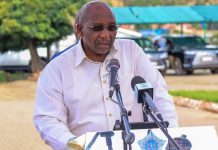Africa-Press – Lesotho. Rishi Sunak has been nominated Britain’s prime minister after a chaotic few weeks that saw Liz Truss resign after 45 days in office marked by financial turbulence and multiple reversals on tax policy, and a last ditch effort by Boris Johnson to make a fresh bid for the post he was forced to vacate in early July.
Mr Sunak’s appointment, the third in the space of four months, has been done without going through the due electoral process, thus giving rise to questions about the legitimacy of this appointment and to calls for an early election, which is quite unlikely to take place in view of the Conservative Party’s current poor ratings.
This brings us back to Pravind Jugnauth’s appointment as Prime Minister in January 2017, after he took over from the leader of the 2014 ‘Alliance Lepep’.
The circumstances surrounding his nomination had been widely criticised as constituting an unwarranted change of Prime Minister as it was not mandated by a plebiscite at the polls – although from a constitutional point of view, it could have been viewed as perfectly in order.
However Pravind Jugnauth took office some 11 months before the holding of the by-election in Constituency No. 18, which the then opposition held up as a test for the electors of the constituency to express their opinion on the performance of the MSM-led government and on the controverted change at the helm of government.
The MSM chose to be absent from the by-election, and missed an opportunity to seek the stamp of popular approval that would have given legitimacy to the nomination of Pravind Jugnauth as PM.
But he was thereafter elected, after winning the 2019 general elections though contested through electoral petitions by the Opposition, as Prime Minister, a post which goes to whoever is the leader of the party which commands a majority in Parliament. No such cloud hangs over Rishi Sunak’s appointment as Britain’s first non-White Prime Minister.
His Asian descent has not come in the way of his appointment since his track record as Chancellor of the Exchequer during the Covid pandemic has been seen by the Conservative Party as ‘a safe pair of hands’ to stabilize an economy sliding toward recession.
His task, some commentators have suggested, is to fix the British economy – and ‘take the blame for anything that goes wrong’. But the real test of the changing British political mores will come in two years’ time when the choice of Rishi Surnak as leader of the Conservative Party into the next general elections will have to be confirmed. Mr Sunak’s performance as Prime Minister will hopefully weigh in that decision – not his ethnic origin or caste.
For More News And Analysis About Lesotho Follow Africa-Press






